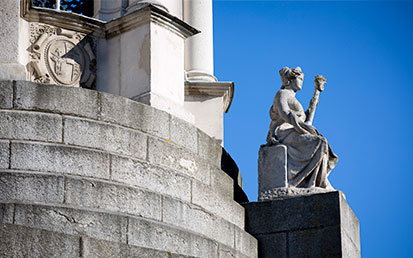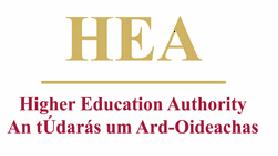Moderatorship in Theoretical Physics

Is this course for me?
The first two years of the course (the Fresh years) aim to provide students with the broad background in both mathematics and physics that is required for a proper understanding of present day theoretical physics. In these two years Theoretical Physics students take the complete Physics lectures and practicals, together with a considerable part of the Moderatorship course in Mathematics.
The final two years (the Sophister years) of the programme consist of modules in mathematics and theoretical physics (including quantum mechanics, general relativity, electromagnetic theory, statistical mechanics, statistical physics and fluid mechanics) provided by the School of Mathematics, and a selection of specialist physics courses (including electromagnetism, modern optics, statistical thermodynamics, spectroscopy, solid state physics, nuclear physics, geophysics and astrophysics) from the School of Physics. In the third year the physics course includes some practical work, and in the final year students have the option of either a short computational physics project or further laboratory work.

My experience studying theoretical physics at Trinity has been a positive one. Starting from the basics of classical physics and mathematics, the course is structured so that you are repeatedly building on frameworks that were established in previous modules. The culminative effect of this process has enabled me to work with and understand notions like spacetime curvature and quantum fields that seemed like science fiction before I started the course. Further, the theoretical physics student community in Trinity is open and collaborative, so I never felt like I struggled through tough course content alone. As I look towards graduate studies in theoretical physics, I believe that the past four years at Trinity have prepared me well, and I am glad to have taken the course.

I have found the course to be intellectually demanding but extremely rewarding as you are encouraged to approach challenging problems in new ways. Additionally, the lecturers are incredibly knowledgeable and passionate and are genuinely invested in students' progress and understanding, always taking the time to clarify difficult concepts and encourage deeper thinking.
One aspect of the course I did not expect to be so impactful to my experience is the small class size, which fosters a great camaraderie among students. We often collaborate on challenging problems, supporting each other through the more difficult parts of the course. This close-knit environment makes learning both engaging and enjoyable.
Course overview
Special entrance requirements: H3 in Leaving Certificate Mathematics and Physics or equivalents.
Summary
A four year honors degree course combining courses in mathematics and physics. The programme emphasises the theoretical side of physics but includes experimental aspects. It also includes a range of courses in pure and applied mathematics and an introduction to computing. Some of the topics covered are relativity, cosmology, astrophysics and quantum mechanics, lasers, magnetism and superconductivity.
Course Objective
The Theoretical Physics programme in Trinity is designed to provide students with a solid background for further study or work in any area of experimental or theoretical physics. It includes computational physics. Having a large mathematics component it is also an excellent foundation for work in almost any numerate or logical discipline.
Course Content
The underlying theories of physics are described in mathematical terms, so a theoretical physicist needs a good understanding of both subjects. Cosmology, astrophysics, chaos, relativity and quantum mechanics are just a few of the exciting topics in theoretical physics while the more practical side of the course involves the latest ideas in magnetism, superconductivity, lasers and semi-conductors. This course is taught jointly by the Schools of Mathematics and Physics.
In the first two years students take Physics lectures which review all classical physics, introduces modern physics and is backed up by a comprehensive laboratory course. It is combined with mathematics modules in Algebra, Analysis, Mathematical Methods, Mechanics and Theoretical Physics. In the third and fourth years students choose from a selection of modules from both mathematics and physics. Practical work is not compulsory in the final year, although there is an experimental option for those who wish to maintain contact with the experimental side of the subject, in preference to a project.
Course Assessment
Students are assessed by means of continuous assessment and examination.
Modules
Learning outcomes
On successful completion of this programme, students should be able to:
- Tackle a wide range of topics using powerful analytical tools including formal methods in classical and quantum physics
- Clearly communicate information and conclusions in written and verbal formats on core ideas in Theoretical Physics
- Evaluate complex problems and formulate solutions, identifying the role of theory, hypothesis and experiment in the scientific method
- Apply computers to the solution of problems in theoretical physics
- Plan, carry out and report a theoretical physics based investigation
- Apply classical and quantum theoretical techniques in research
- Work independently in a research environment and as part of a research team
- Undertake professional work in physics at a high level.
Career Opportunities
A degree in Theoretical Physics can be a starting point for a career in research in a university, government agency, or in industry in the fields of astronomy, meteorology, computing hardware and software, aerodynamics, statistics, instrumentation, atomic and nuclear physics. Graduates may also choose to go on to a career in teaching, finance, actuarial work or management.
Funding Partners




This course is funded by the Irish government under the National
Development
Plan 2007-2013 and aided by the European Social Fund (ESF) under the
Human
Capital Investment Operational Programme 2007-2013.

